Update: This article was last updated on 5th December 2024 to reflect the accuracy and up-to-date information on the page.

Mumbo Jumbo, slumped posture, tight-lipped, coyness, sulkiness, aggressiveness, nervousness, etc. – have you noticed any such things in your child when they communicate? Are you conveniently ignoring them? That means you are not paying attention to your child’s communication skills for kids. It may sound harsh, but ignoring child communication skills could jeopardize your child’s future because the demand for professionals with soft skills is on the surge. They are more valued than technical skills.
Can’t believe this?
Then, believe the study published by Wonderlic, a trusted name in pre-employment assessment. According to the study, 93% of hiring leaders stated that soft skills are an “essential” or “critical” element when making hiring decisions. What’s more, many employers reported that soft skills are more important than tech skills.
And that’s not all.
Soft skills have become such an integral part of the hiring process that the top-notch global management company McKinsey carried out a report on the crucial role of soft skills in the workspace. The McKinsey report underlined the rise in demand for age-appropriate communication and soft skills in the modern labor market and that it will continue to grow until 2030.
Helping children learn conversation skills and communication at an early age is critical. Parents and educators should focus on ways to develop communication skills in preschoolers to set a strong foundation. An effective form of communication with children is through activities, storytelling, and active listening. Schools can also emphasize how to improve communication skills for students to prepare them for future challenges better.
We interchangeably use communication skills and interpersonal skills and soft skills.
What does it mean?
Coherence, eloquence, politeness, and assertiveness without aggressiveness are some of the elements of flawless communication. Communication skills have become an enabler for success. This is a fact substantiated by the LinkedIn Global Talent Trends Report, which says 92% of professionals who acquire talent report that soft skills are more important to hiring than hard skills.
The LinkedIn Workplace Learning report puts soft skills at the top of education priorities for 59% of US HR managers who believe it is challenging to find candidates with the right soft skills. The LinkedIn Workplace Learning report puts soft skills at the top of education priorities for 59% of US HR managers who believe it is difficult to find candidates with the right soft skills.
The fact that soft skills have become essential job skills underlines their importance.
Are soft skills inherent?
The answer is that soft skills can be both inherent and learned. Some people are born with soft skills, and some learn them. This means that there is always potential for children to improve their communication skills, offering hope and optimism to parents and educators.
Many children have major trouble putting their ideas into formidable sentences and, with the everlasting fear of judgment, fail to speak well. Age-appropriate communication strategies can help them overcome this handicap. Introducing conversation skills and using the most effective form of communication with children ensures better learning.
Parents and teachers can focus on activities designed to develop communication skills in preschoolers, such as storytelling, role-playing, and group discussions. These activities serve as excellent means of communication for kids and encourage confidence in public speaking. Teaching kids how to express themselves and how to improve their communication skills is crucial for their growth in a competitive world.
Everything starts at home. Here are 11 ways to improve communication skills in children:
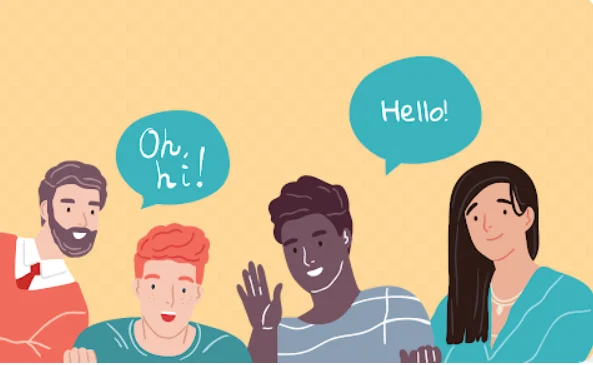
Image Source: https://preply.com/
1. Talk, Talk, Talk…
The primary element of teaching effective communication skills is to initiate conversations. Encourage your kids to express themselves. Ask them to narrate their experiences in the playground, with friends, in school, etc. Develop communication skills in preschoolers by making interactions engaging and tailored to their level.
Weed out the hurdles in their communication; prompt them with the right words or phrases when they are stuck. This process also helps improve child communication skills and fosters age-appropriate communication abilities, making it a more effective way form of communication with children.
2. Create a cozy and comfy communication environment
Children often suffer from inhibitions. They need the right environment to communicate and open up. For instance, many children are comfortable when you put them to bed—they talk and share without any inhibitions before drifting away to the world of dreams. Others open up while eating, and many turn into chatterboxes while going for a drive. You have to find your child’s comfort zone, which is an effective form of communication with children.
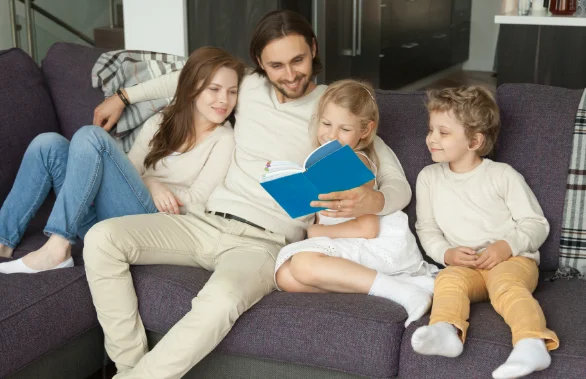
For that, be observant. If you want them to open up, avoid preaching during the conversation. Try to build empathy.
For that, be observant. If you want them to open up, avoid preaching during the conversation. Try to build empathy, as it helps improve child communication skills and enhances conversation skills. By focusing on age-appropriate communication, you can further develop communication skills for kids and work to improve communication skills for students. Such practices are also valuable in developing communication skills in preschoolers and encourage better means of communication for kids.
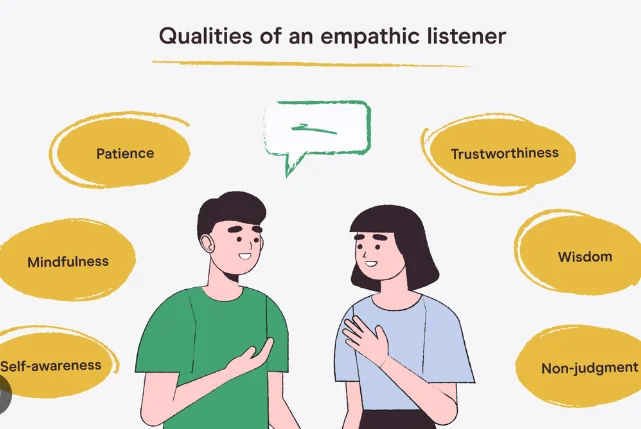
Image Source: https://www.paretolabs.com/
3. Be an empathetic and compassionate listener
It is important for children to feel genuinely heard. Listening is a part of effective communication skills. There needs to be more good listeners. So, make sure that when your child is sharing a story, you are attentive. Listen intently to what your child has to say and ask follow-up questions.
For instance, if the conversation revolves around their school project, first ask them to share their plans to complete the project. Avoid giving your input. You can softly insert your suggestions when they are stuck. This practice also helps develop communication skills in preschoolers and teaches age-appropriate communication techniques, ensuring an effective way form of communication with children.
4. Body Language
Good communication skills for kids include the right body language, perfect gestures, and controlled facial expressions. However, teaching them the right body language can be tricky.
But you can start with simple things—tell them they should avoid rubbing their eyes, twisting their hands, tapping their foot, or sticking their tongue out while speaking.

Image Source: https://www.theladders.com/
For instance, if the conversation revolves around their school project, first ask them to share their plans to complete the project. Avoid giving your input. You can softly insert your suggestions when they are stuck. This practice also helps develop communication skills in preschoolers and teaches age-appropriate communication techniques, ensuring an effective way form of communication with children.
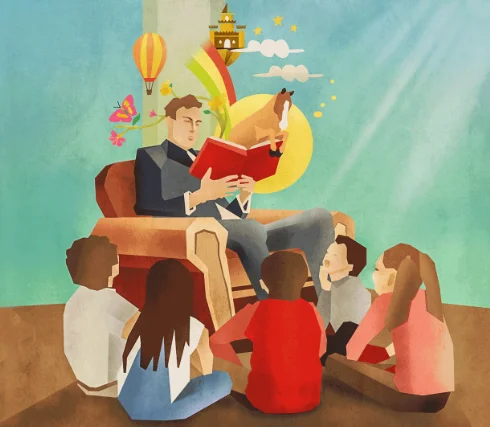
5. Picture Storytelling
Picture storytelling is an engaging and fun way of learning communication. You can show pictures to your child and ask them to arrange them in a logical sequence and create a story out of them. Please encourage them to talk about what they perceive in the pictures, their colors, and other details. This is a great means of communication for kids, helping to improve communication skills for children and communication skills for kids. It also helps build conversation skills and enhances children’s communication skills.
Image Source:https://martech.org/
By using this method, you can develop communication skills in preschoolers in an age-appropriate communication way. It’s an effective form of communication with children that aids in improving students’ communication skills.
6. Active Listening
The foundation of effective communication is active listening, a process whereby learners engage in activities that require effective verbal expressions, fostering interactive engagement that contributes to enhanced communication proficiency. Means of communication for kids, communication skills for children, and communication skills for kids are key to nurturing these abilities.
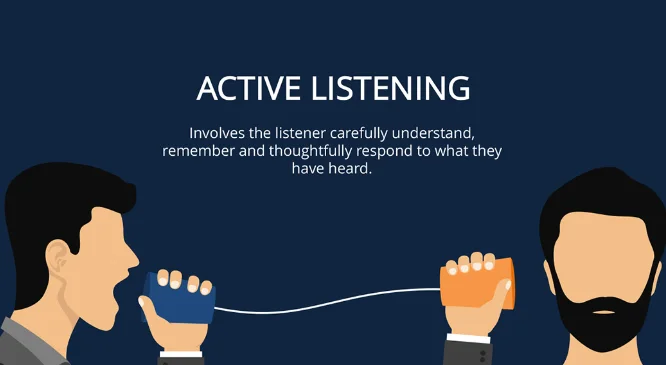
Image Source: https://slidemodel.com/
Active learning components that help in improving communication skills include Interactive Discussions, Collaborative Projects, Problem-Solving Scenarios, Role-Playing Exercises, Real-world Applications, Storytelling and Narrative Techniques. These components collectively contribute to a holistic approach to enhancing communication proficiency through active learning.
- Collaborative Projects
- Problem-Solving Scenarios
- Role-Playing Exercises
- Real-world Applications
- Storytelling and Narrative Techniques.
These components collectively contribute to a holistic approach to enhancing communication proficiency through active learning.
For instance, communication around a fight with a friend or a classroom incident can build up emotions.
So, teach them to narrate an incident without getting emotional.

7. Avoid emotional conversations
It is extremely challenging to keep our emotions aside while talking. Forget about children; even adults can’t do it. However, good communication skills require you to have control over your emotions.
Children are often drawn into an emotional conversation, and it’s important to focus on means of communication for kids, as well as building communication skills for children. Developing strong communication skills for kids will help with conversation skills and improve their child’s communication skills. It is crucial to develop communication skills in preschoolers through age-appropriate communication. Parents and educators should explore effective way forms of communication with children to improve communication skills for students.
8. Teach Empathy
Empathy is a beautiful trait. When you teach your kids communication skills, try to inculcate a sense of empathy and consideration of the feelings of others in them. Children must know that the world exists outside their viewpoint, too, and they should be ready to listen to what others have to say. This helps them become better listeners and also speak more respectfully.
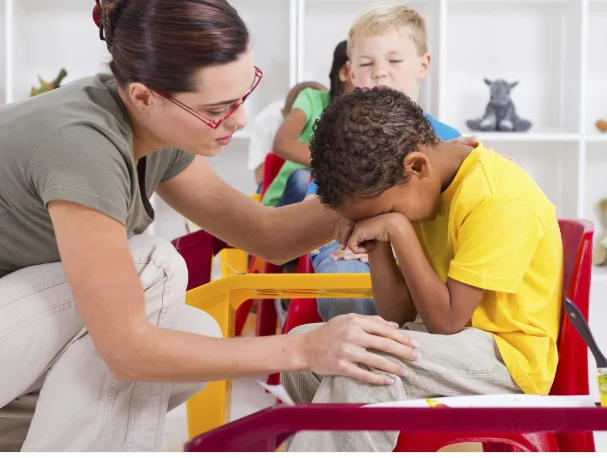
Image Source: https://www.google.com/
Encouraging the right means of communication for kids will help them develop their communication skills and improve their conversation skills. You can also focus on how to develop communication skills in preschoolers by using age-appropriate communication strategies. There are also effective ways to form a communication with children that can improve their child’s communication skills and help them learn how to improve communication skills for students.

Image Source: https://elearningindustry.com/
9. Encourage Introspection
Children are very observant when it comes to their surroundings, but they hardly introspect. Introspection means analyzing one’s feelings and thoughts. For instance, when your child is rude to someone or angry with something, you gently try to make them think about what exactly triggered their emotions. Coax them into finding the right answer. Understanding yourself is an important element of speaking well.
This is a fundamental part of developing strong communication skills for children, which are essential as an effective means of communication for kids. By helping children reflect, parents and educators can foster communication skills for kids that will serve them throughout their lives.
Developing communication skills in preschoolers early on encourages better conversation skills and child communication skills. It is important to focus on age-appropriate communication to ensure children understand how to express themselves. This can also help improve communication skills for students in more advanced stages. Finding an effective way of communicating with children encourages emotional intelligence and fosters healthier interactions.
10. Teach Respectful Vocabulary
Being straightforward or transparent is good, but not at the cost of others’ dignity or self-esteem. It is important to teach children the means of communication so that they can express their emotions without becoming rude or offensive.

Anger is man’s biggest enemy, and it ruins everything. It is natural for children to feel angry and react violently to some situations.
Parents must teach their children respectful alternatives for such conversations and remind them that anger often makes things worse.
For instance, calling someone stupid may have an adverse effect than saying I don’t quite agree with you. Moreover, there are a lot of cultural terms that are used in a derogatory manner for a particular set of people, communities, or society.
Children may never learn the origin of such terms. Therefore, it is the responsibility of parents to make their children aware of such terms.
Sometimes, a lack of vocabulary makes people sound round. The intent is good, but the words used to express the feelings are not gentle. Communication skills for children, backed by beautiful vocabulary, will give your child an edge over others. Learning communication skills is essential for kids, especially when developing conversation skills that help them express themselves appropriately.
Teaching child communication skills at an early age is crucial for success. Parents can help develop communication skills in preschoolers by encouraging age-appropriate communication techniques. Knowing how to improve communication skills for students can further enhance their confidence and ability to communicate effectively. Parents should also be mindful of the effectiveness of communication with children to ensure they grow up with positive and respectful communication habits.

11. Encourage Journaling
Writing brings clarity to thinking. Encourage your children to write about their day-to-day activities and feelings. It can be very fruitful and help them let out their emotions easily. The exercise could make them articulate.
This could also help them feel more confident and prepared before approaching someone to have verbal communication.
We have shared 11 ways of effective communication with you. You can start with any, depending on your child’s age.
You can also use the help of communication activities and games available to kids.
So, what are you waiting for? Get started!
Explore different means of communication for kids, improve communication skills for children, and enhance conversation skills. Work on child communication skills and develop communication skills in preschoolers through age-appropriate communication. These tips also guide you on how to improve communication skills for students and find effective ways to communicate with children.
Looking for a comprehensive parenting guide to ensure you are on the right track? Explore a wealth of parenting wisdom and educational insights in Moonpreneur’s blogs. Additionally, you can join our programs that nurture the next generation of innovators. Book a free trial now!
















What’s one surprising way you’ve seen a child enhance their communication skills in everyday situations?
I once witnessed a child, through playing collaborative video games, develop exceptional teamwork and communication skills, effectively coordinating strategies and problem-solving with peers.
How can parents and educators encourage shy or introverted children to develop strong communication skills?
Encouraging small group activities, providing a supportive environment, and praising their efforts rather than outcomes can empower shy children, gradually boosting their confidence and communication abilities.